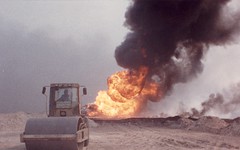 The newspaper is feeding us a steady diet of elections, uprisings and war. However, given my exceptionally shallow personality, there’s only one controversy that’s occupying me right now: the great Riesling debate.
The newspaper is feeding us a steady diet of elections, uprisings and war. However, given my exceptionally shallow personality, there’s only one controversy that’s occupying me right now: the great Riesling debate.
Riesling is a grape that holds pride of place for many connoisseurs because of its remarkable longevity and the ease with which it captures the naked, unmitigated taste of the soil on which it’s grown. It also gives a winemaker exceptional versatility — by turns Riesling can be bone dry, sweet, mellow or sharp as a sabre.
However, one flavour that appears in many styles of Riesling is a unique aroma which is usually described as petrol, although I have also heard the terms “kerosene,” “gasoline” or (to borrow my own phrase) “plastic.” These may sound like fanciful descriptors, but this aroma is caused by a hydrocarbon called “1,16-trimethyl-1,2-dihydronalthalene” — the same sort of compound that makes up crude oil.
The great Riesling debate began in early May when the influential French winemaker Michel Chapoutier told Decanter Magazine, “Riesling should never smell of petrol. That is a result of a mistake during winemaking.” To some Riesling lovers, saying that the petrol smell is nothing but a defect was akin to telling a group of musicians that music should never be played in B-flat minor because that key is a mistake in tuning.
Chapoutier’s pronouncement summoned a storm of pique over what makes or breaks a good Riesling. He later enlarged his opinion in a thoughtful interview. A few days later, I met three German winemakers to discuss their Riesling. Since Riesling is the German grape par excellence, these winemakers had decades of collective experience growing the grape. This is a salubrious contrast to Chapoutier, who is new to making Riesling.
“Petrol is actually a sign of good quality of the wine,” said fifth-generation winemaker Fritz Hasselbach, of Weingut Gunderloch. Fritz’s colleague Rainer Lingenfelder of Weingut Lingenfelder added, “Petrol is always a sign for slate vineyards.” This is why petrol is often found in the wines of the Mosel region of Germany, where slate abounds. Although petrol can be found in young wines, it is much more common in aged Rieslings, and it can develop in intensity over time.
Wine is merely a matter of taste, so there’s no point in getting too lathered about Chapoutier’s opinion in one direction or the other. It’s worth noting that Chapoutier’s own winemaking tends to reject Old World funkiness in favour of a cleaner international style that markets well in the USA. In this sense, his skepticism of traditional European petrol is unsurprising. For my part, I love petrol notes, although I won’t dwell on the righteousness of my view. Why throw gasoline on the fire?
Matthew Sullivan is a civil litigator in Toronto. He blogs once a month here on lawandstyle.ca. The Short Cellar column also appears in the print edition of Precedent. Matthew can be reached at matthew@lawandstyle.beta-site.ca. Follow along on Twitter: @shortcellar.
Photo by Bryan Dorrough

